Harry Styles Explored “The Sensuality Of Touch” With Co-Stars For Role In ‘My Policeman’, Says Film’s Director Michael Grandage – Toronto Q&A
- Oops!Something went wrong.Please try again later.
- Oops!Something went wrong.Please try again later.
- Oops!Something went wrong.Please try again later.
- Oops!Something went wrong.Please try again later.
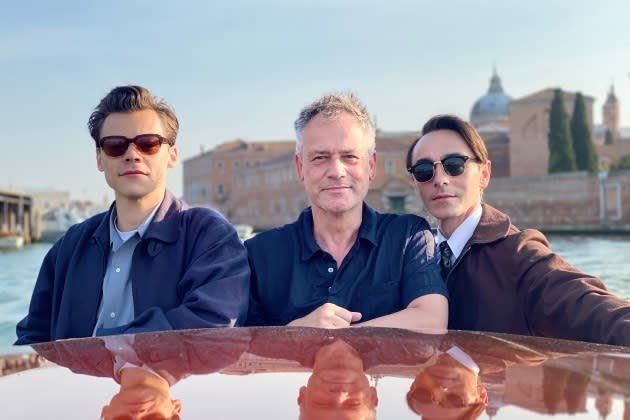
EXCLUSIVE: Michael Grandage gathered the cast of My Policeman for two weeks of rehearsals prior to the start of principal photography. The sessions included choreographing intimate moments involving actors Harry Styles (Don’t Worry Darling), Emma Corrin (Lady Chatterley’s Lover) and David Dawson (The Last Kingdom), and Linus Roache (Homeland ), Gina McKee (Notting Hill) and Rupert Everett (The Happy Prince) who were playing the older versions of the younger actors.
Grandage brought on choreographer Ben Wright, a frequent collaborator on Grandage’s theater productions, as intimacy coordinator. He told him he wanted the scenes to reflect something that he felt was “an absolute key theme of the film.” Which, he said, “is about the sensuality of touch, of whether it’s that first touch on the neck between Harry and David, whether it’s the ritual washing as Gina does with Rupert, whether it’s the touch of high levels of intimacy …that’s what I want to really explore with the actors.”
More from Deadline
Toronto Review: 'Chevalier' Written By Stefani Robinson And Directed By Stephen Williams
Harry Styles Talks Timeless Quality Of Role In 1950s Love Triangle Tale 'My Policeman'
Above all, Grandage wanted his cast — especially Styles and Dawson, who do the heavy lifting when it comes to “high levels of intimacy” in My Policeman — to be comfortable with it.
My Policeman, which receives its world premiere at the Toronto Film Festival on Sunday night, is based on Bethan Roberts’ novel about Tom Burgess, a young police constable, circa 1957, stationed in Brighton on the south-east coast of England. Unsure of his sexuality, PC Burgess meets Patrick Hazlewood (Dawson), curator of a local art gallery, while also entering into a marital relationship with teacher Marion Taylor (Corrin).
The film arrives, Grandage warned, at a time when the huge gains in making a more open society “are beginning to feel fragile again.”
When Grandage and the My Policeman production shifted over to Venice to shoot scenes with Styles and Dawson, he wanted the characters, because they’re abroad, to be “completely free” to heighten the intimacy. “So, I outlined a scene where one of them could stand at the window looking out, one of them lie on the bed having a cigarette. But ideally, we can only tell that story of complete abandonment if you’re not all a bit suddenly covered up, and…how do you feel about that?’ “
Styles and Dawson, Grandage told Deadline, responded, saying: “Look, we’re up up for trying to tell the story in the best possible way.” In other words, everybody was in agreement about how free the men were, and how not free, I supposed Tom was in terms of displaying intimacy. Somehow, it wasn’t abandoned and free when he was with Marion; somehow he had a different feel with Patrick.
”Harry and David were very much up for that,” Grandage said.
”We did choreograph, if that is the right word, the main intimacy scene between the two of them,” said the director.
He made them a promise. “I said to them: ’Whatever the camera catches, or doesn’t catch, I will always show you it before I put it into a final edit, always. Even if it’s not contractual, I don’t care. You will see something that I would like to put on the screen before it ever gets to anybody higher up.’ I stuck to my word with that. I showed them everything, and they were very, very happy.”
Grandage believes that because of his “pact” with the actors “as a result, I hope you agree, we got some very beautiful intimacy scenes that I think really help the film, actually.”
Styles has, in interviews, told his fans that there’ll be what he termed “a bit of bum-bum and no peen.”
Grandage tried to translate what Styles might have meant. “He’s telling his fans: ‘I’ve seen the finished film and I can tell you what you will and what you won’t see.’ I think he’s preparing his audience for the fact that they might see a bit of bum-bum, but they won’t see a bit of peen.”
He laughed, then added, “What strange words, I thought, when I read it. It was such a weird way of putting it. But in a way, I thought it was rather innocent, it was rather lovely in the way he chose to let that out there.”
My Policeman is set in two eras: late 1950s, when homosexuality in the UK and the U.S. was illegal, and 1990, when same-sex relationships had emerged into the light.
Grandage said that Styles was “very, very articulate” during production about the “potential political relevance” of the film, and that Styles was “discussing the need to get a story like this that can tell a whole generation of people about something maybe they don’t know about, and that is, what the world was like in 1950s England for people like Tom, for people like Patrick, and Harry was very aware that that is quite a powerful story to get out there to a younger generation.”
It helps people, he said, “to understand all of the incredible forward momentum that has happened since.”
Sighing, Grandage acknowledged that he’d be having a very different conversation now, months after the film was shot. He was alluding to the U.S. Supreme Court’s reversal of Roe v Wade, “and the discussion that many, many political commentators think that gay marriage will be the next on that agenda, and here in our own country [the UK], there are conversations in some quarters about whether gay marriage should be discussed in our own society.
”What’s fascinating,” he continued, “is that all of that has been unfolding since we’ve wrapped the film. It was all unfolding in the undercurrents of society before. But it’s come to a head since then.”
There’s a chance that My Policeman could spark off and widen the scope of the debate on societal and political values. Grandage agreed. “ I think we’re in a place now where My Policeman can offer a point of view and the opportunity for debate on a much more significant level than anything we might have thought before we even started the project, because of where the world is going at the moment.”
Grandage said it’s worth noting that “I was born into an England 1962 where it was still illegal to practice homosexual activity of any kind. It was all against the law. And in my own lifetime, now 60 years old, huge momentum has been made.
”I just think we are now in a place where intimacy in the film between Patrick and Tom is something that others can now experience without fear of breaking the law. I think that’s a great thing that needs to be celebrated. But I feel the huge gains in creating a more open society around the world are beginning to feel fragile again,” he said with concern.
”I can see this film as an opportunity to create that debate,” Grandage said.
Grandage explained that he became involved with My Policeman when Robbie Rogers (All American) read the novel and passed it to his partner Greg Berlanti (The Flash), who runs Berlanti Productions. The tome was then passed onto Ron Nyswaner (Philadelphia), who adapted it.
Grandage met Berlanti and Roger’s in New York, where they made him a straight offer.
They set about casting for the role of older Marion “because, in a way, you could argue that it’s Marion’s story, because she’s the one that makes the decision that changes everybody’s lives at the end of the film. In the early part of the film she’s the one in the middle, as it were.
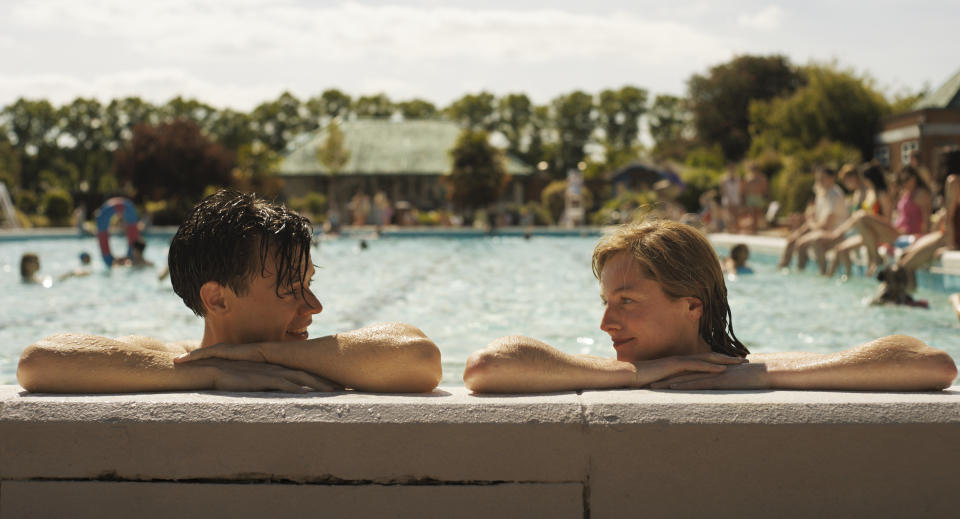
DEADLINE: Did you find your Marion quickly?
GRANDAGE: Not at first. The script was swishing around CAA, and so one day, we got this curious call. it was Harry’s agent at CAA. He said: ”Just so you know, we shared this script with Harry, and he has responded to the material and would love to meet you.” Then they did that lovely thing of going: ‘If that’s okay.’ At the time Dunkirk was just out, and he’d been wrapping on Don’t Worry Darling.
I met with Harry at my offices in London, at the top of one of the theatres in the West End.
I was astonished. He’d read the novels, which I would have expected, but sometimes don’t over-expect. But the bit that had easily astonished me was he’d read the screenplay so many times, clearly numerous times, because he was able to quote quite a lot of the material that didn’t even involve the character of Tom, which shows an astonishing level of understanding. He was briefed and prepared with a real understanding of both the novel and the screenplay that I thought: I don’t understand why I wouldn’t do this, actually. I don’t understand why I wouldn’t want to go here? ‘You are charismatic, you have proved that you want to be on screen, your want to carry on doing film work; you are intelligent and up for discussion. I think we’ve got to try and make it a reality.’ It was very, very straightforward once we got him. I think we did then decide to cast the other two [young] actors first and then find the older actors to respond to the younger cast.
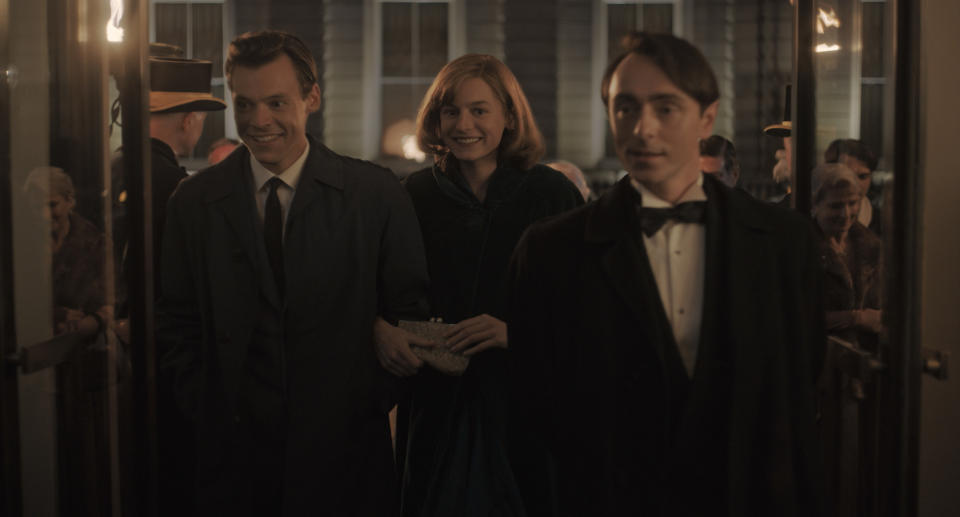
Prime Video
DEADLINE: Who did you find first? Young Marion or young Patrick?
GRANDAGE: The next place we went was young Marion. That was a very interesting list of young actresses who were doing a lot of very brilliant work at the time. But one name on this list that I was aware of because I’d seen photographs coming out of Princess Diana in The Crown. The season hadn’t been aired then. It was Robbie Rogers who said that he was hearing really good things about her. I met her and really liked her.
DEADLINE: You’re referring to Emma Corrin?
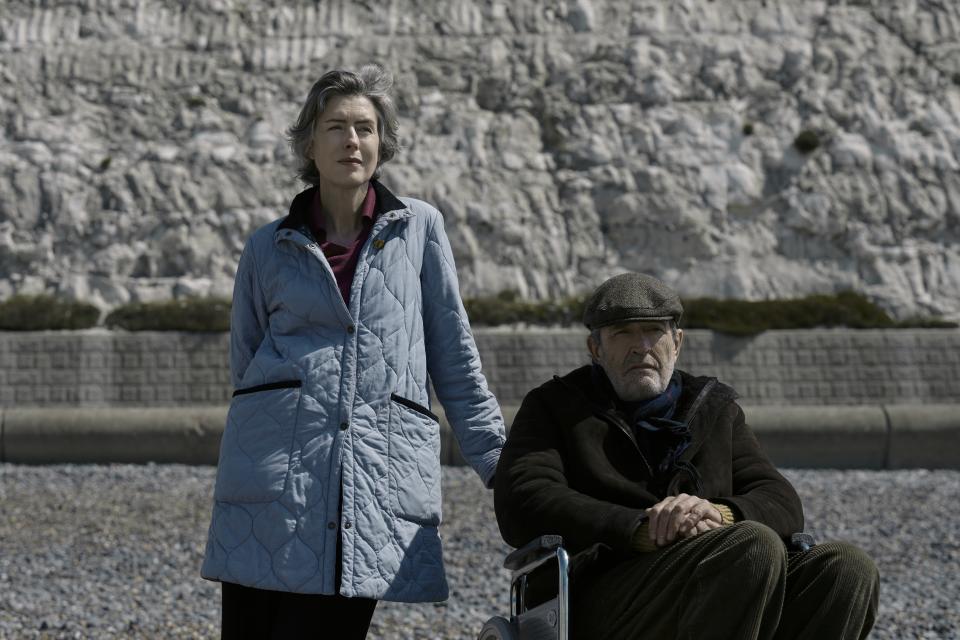
Prime Video
GRANDAGE: Yes, I met Emma and talked about the piece and they were very clear, very quickly, that this would a great next role for them to play. There’s nothing worse for a director than to be in a room to try and convince an actor to be in something, in the theater or in a film. You just don’t want to do it. You want to be opposite an actor who wants already to be in it, therefore the meeting is just about you discussing possibilities. That’s what it was like with Emma, that’s what it was like with Harry. That’s what it was like with David, Linus, Gina and Rupert. Rupert came on in a Zoom and he went: “I love this.”
That was the first thing he said. It means, immediately, that’s you’re not in this place, where you’re going into either meetings or Zoom rooms, and part of your job is to convince them to play it or you have to somehow sell the film, and then they say: ‘Give me some time to think about it.’ And then you don’t hear from them for weeks. None of that happened on this film. The deals were done quite quickly, and we never met anyone else.
Emma was an extraordinary thing. They’d already met Harry, they already knew each other a little bit. I don’t wish to say it’s always this way, because you know it isn’t. I think they were attracted to it for the reasons we’ve discussed, but also that doubled time frame — 1957 and 1990 — is complicated. I think actors love that kind of complexity in a script.
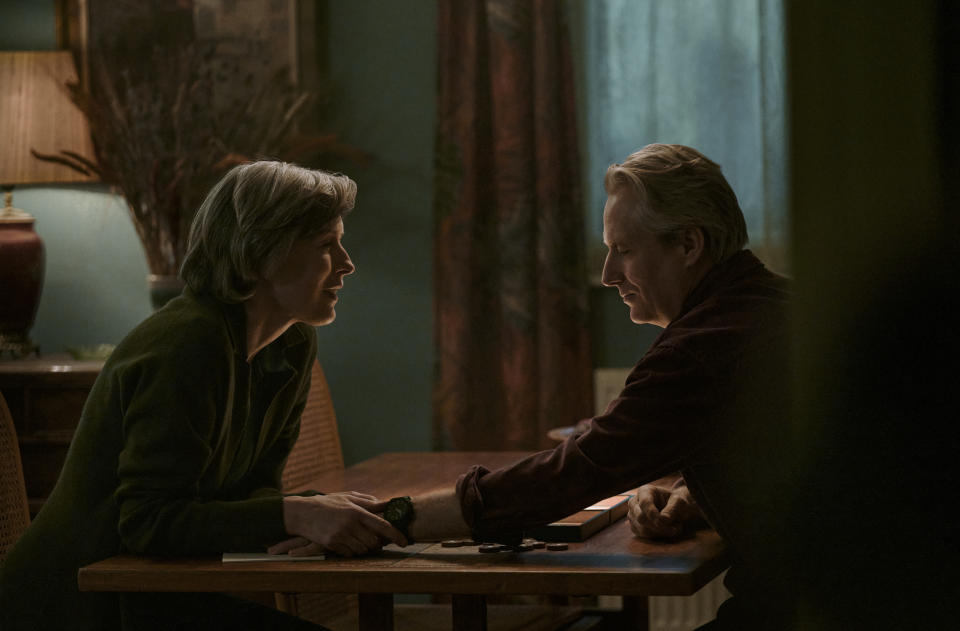
Prime Video
DEADLINE: Did you know David Dawson before you cast him?
GRANDAGE: David’s screen and theater work is extraordinary. He’s got a sense of period, which I love. There’s something about his face and about his eyes and the way he expresses himself that is very helpful for us to understand that period [late 1950s].
DEADLINE: I felt the same about Harry. He’s got what I call an old English kinda face from outta the past, but fresh at the same time.
GRANDAGE: Where Harry interests me as an actor, I look at a very young Albert Finney, Tom Courtenay, all those working-class lads who broke through in the cinema in the early 1960s. He reminds me a little bit of them. Where he comes from in the North, and the fact that he has a fearless quality that I always think they have, when you look at a young Finney, particularly. I love working with Harry because he sort of, clearly, from his other life as an international artist and a live performer, he has a very, I would say, very exciting understanding of how to use adrenalin … you can just tell that.
So when you shout “Action,” you know, some people when you shout action you see all sorts of weird things happening where they all start getting tense and everything else. You shout “Action” to people like Harry and Emma. I have to say, you just see them relax. They have a fearless quality and it’s so good they understand about channeling adrenalin, and that they just go, “Yeah! This is about an opportunity to do something,” as opposed to going, ‘What am I doing, what do I do?’ It’s very free.
DEADLINE: I like how you’ve used art to reflect on art, particularly in the gallery scenes where Patrick works. J. M.W. Turner’s seascape SnowStorm – Steam-Boat Off a Harbour’s Mouth has a pivotal moment, and there’s a William Blake, and Raising of Lazarus.
GRANDAGE: The main picture that’s the catalyst for their relationship [Tom and Patrick’s], because that’s the painting they meet over, is the Turner. It’s semi-abstract, and Patrick’s able to say to Tom, ‘What do you see?’
He sees turmoil, the sea, the crashing of the waves, and how precarious it is. Patrick has a very difficult life, but at least he knows who he is and he’s comfortable in his skin about being a gay man. But he knows also it’s illegal. Tom hasn’t really found who he is. He knows something about himself, that he’s in denial about, and he knows it’s the cause of great turmoil — so they look at this painting … which then becomes, if you like, the backdrop to one big thing for me for the film: I was really looking for an opportunity to be able to make a film this time that was able to use a lot of the visual language… as a way to tell the story.
DEADLINE: You ran London’s Donmar Warehouse Theatre for a decade and then you established the Michael Grandage Company that combines your film, theater and community charitable work. You’re rehearsing something with Dawn French and you’re doing a stage collaboration with Emma Corrin. Right?
GRANDAGE: I’m rehearsing Dawn French (The Vicar of Dibley) for her new one-woman show called Dawn French is a Huge Twat. The previous show, 30 Million Minutes, was more about her life — relationships with family and everything. This one much more about her career.
With Emma, we’re doing a new adaptation of Virginia Woolf’s Orlando [opening in London’s Garrick Theatre from November 25 for a limited season]. He, Orlando, time-travels and becomes She Orlando through centuries, and I just think that’s a great theatrical device. One hundred years ago, Virginia Woolf was writing about gender identity, 1928, nearly a hundred years ago. That’s how history works, progress is always being made, and suddenly …
DEADLINE: Does Harry Styles have any interest in treading the boards? I reckon he could do it, depending on play, venue, and so on.
GRANDAGE: I said to Harry, I’d love to if you ever want to do any theater. I’d be surprised if he wants to do theater. His theater is his music. He’s a lovely guy and he’s one hundred percent focused on that music career in a way that I admire.
My Policeman has its world premiere in Toronto on Sunday. Its European premiere is at the BFI London Film Festival on October 15. Prime Video release in theaters October 21. Streams on Prime Video from November 22.
Best of Deadline
NFL 2022 Schedule: Primetime TV Games, Thanksgiving Menu, Christmas Tripleheader & More
The Queen Onscreen: 15 Actresses (And Actors) Who've Played Elizabeth II In Film And On TV
'Blonde' Premiere Photo Gallery: Ana de Armas Channels Marilyn Monroe At Venice Film Festival
Sign up for Deadline's Newsletter. For the latest news, follow us on Facebook, Twitter, and Instagram.

